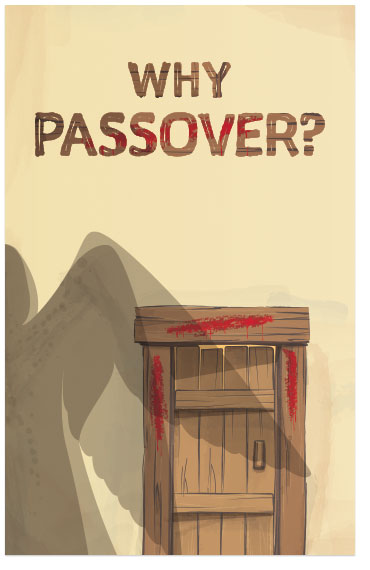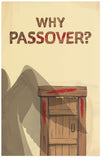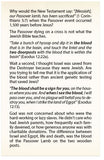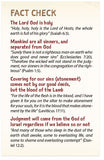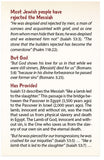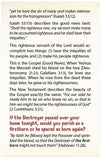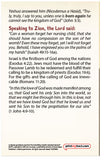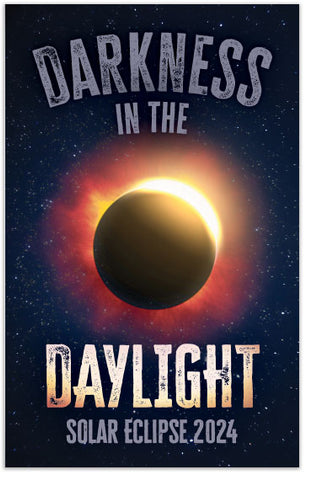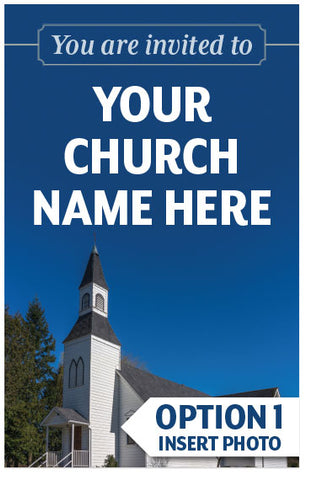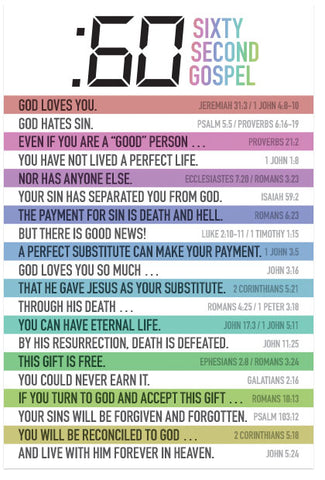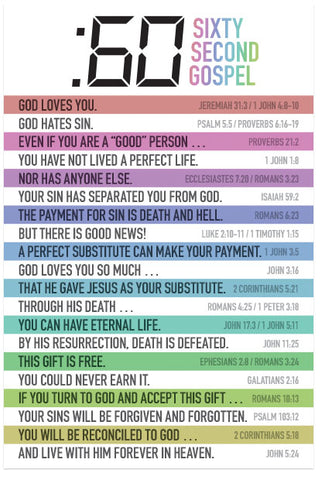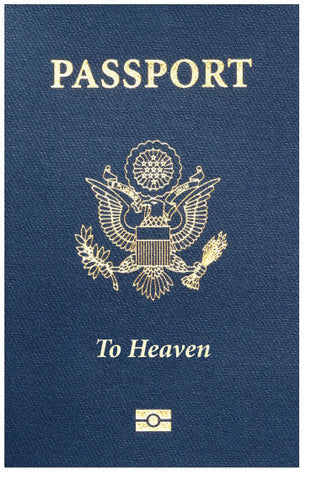Why Passover?
Special-Order Folded Tract
 NOTE: This item is custom-printed to order (click for more details).
NOTE: This item is custom-printed to order (click for more details).
This tract is from our print-on-demand library, and is not kept in stock. Select the options below, and we will custom-print a batch just for you. Because this item is custom-printed, you can add your custom imprint to the back page at no extra cost.
- Estimated shipping date: Thursday, March 26 (Click for more details)
- SKU:
- Discounts: Discount coupons do not apply to this item
- Format: Folded Tract
- Size: 3.5 inches x 5.5 inches
- Pages: 6
- Imprinting: Available with 4 lines of custom text
- Version: ESV
- Returns: Because this item is custom-printed to order, it cannot be returned.
Show all item details
The full text of this tract is shown below in the ESV version. (Do you want to print this tract in a different version than the one listed? Contact us and let us know what you're looking for—we may be able to create the alternate version for you at no charge.)
Why would the New Testament say: “[Messiah], our Passover lamb, has been sacrificed” (1 Corinthians 5:7) when the Passover event occurred 1,500 years before Jesus?
The Passover dying on a cross is not what the Jewish Bible teaches.
“Take a bunch of hyssop and dip it in the blood that is in the basin, and touch the lintel and the two doorposts with the blood that is within the basin” (Exodus 12:22a).
Wait a second, I thought Israel was saved from the Destroyer because they were Jewish. Are you trying to tell me that it is the application of the blood rather than ancient genetic testing that saved Jews?
“The blood shall be a sign for you, on the houses where you are. And when I see the blood, I will pass over you, and no plague will befall you to destroy you, when I strike the land of Egypt” (Exodus 12:13).
God was not concerned about who were the hard-working or lazy slaves. He didn’t care who had Jewish parents, how frequently each family davened, or how generous anyone was with charitable donations. The difference between Israel and Egypt, life and death, was the blood of the Passover Lamb on the two wooden posts.
Fact Check
The Lord God is holy
“Holy, holy, holy is the Lord of Hosts; the whole earth is full of his glory” (Isaiah 6:3).
Mankind are all sinners, and separated from God
“Surely there is not a righteous man on earth who does good and never sins” (Ecclesiastes 7:20). “Therefore the wicked will not stand in the judgment, nor sinners in the congregation of the righteous” (Psalm 1:5).
Covering for our sins (atonement) comes not by our good deeds, but the blood of the Lamb
“For the life of the flesh is in the blood, and I have given it for you on the altar to make atonement for your souls, for it is the blood that makes atonement by the life” (Leviticus 17:11).
Judgment will come from the God of Israel regardless if we believe so or not
“And many of those who sleep in the dust of the earth shall awake, some to everlasting life, and some to shame and everlasting contempt” (Daniel 12:2).
Most Jewish people have rejected the Messiah
“He was despised and rejected by men, a man of sorrows and acquainted with grief, and as one from whom men hide their faces; he was despised and we esteemed him not” (Isaiah 53:3). “The stone that the builders rejected has become the cornerstone” (Psalm 118:22).
But God
“But God shows his love for us in that while we were still sinners, [Messiah] died for us” (Romans 5:8) “because in his divine forbearance he passed over former sins” (Romans 3:25).
Has Provided
Isaiah 53 describes the Messiah “like a lamb led to the slaughter.” This passage is the bridge between the Passover in Egypt (3,500 years ago) to the Passover in Israel (2,000 years ago). The lamb, innocent and without sin, was the mark that saved us from physical slavery and death in Egypt. The Lamb of God, innocent and without sin, is the One who saves us from the slavery of our own sin and the eternal death.
“But he was pierced for our transgressions; he was crushed for our iniquities” (Isaiah 53:5) … “like a lamb that is led to the slaughter” (Isaiah 53:7) … “yet he bore the sin of many and makes intercession for the transgressors” (Isaiah 53:12).
Isaiah 53:11b describes the good news best: “Shall the righteous one, my servant make many to be accounted righteous and he shall bear their iniquities.”
This righteous servant of the Lord would accomplish two things: (1) bear the iniquities of his people, and (2) make his people righteous.
This is the Gospel (Good News). When Yeshua the Messiah shed his blood on the tree (Deuteronomy 21:23; Galatians 3:13), he bore our iniquities. When he rose from the dead three days later, he gave us his righteousness.
The New Testament describes the beauty of the Gospel exactly the same: “For our sake he made him to be sin who knew no sin, so that in him we might become the righteousness of God” (2 Corinthians 5:21).
If the Destroyer passed over your home tonight, would you perish as a firstborn or be spared as born again?
“By faith he [Moses] kept the Passover and sprinkled the blood, so that the Destroyer of the firstborn might not touch them” (Hebrews 11:28).
Yeshua answered him (Nicodemus a Hasid), “Truly, truly, I say to you, unless one is born again he cannot see the kingdom of God” (John 3:3).
Speaking to Zion, the Lord said:
“Can a woman forget her nursing child, that she should have no compassion on the son of her womb? Even these may forget, yet I will not forget you. Behold, I have engraved you on the palms of my hands” (Isaiah 49:15-16a).
Israel is the firstborn of God among the nations (Exodus 4:22). Jews must have the blood of the Passover Lamb to be redeemed and fulfill their calling to be a kingdom of priests (Exodus 19:6). For the gifts and the calling of God are irrevocable (Romans 11:29).
“In this the love of God was made manifest among us, that God sent his only Son into the world, so that we might live through him. In this is love, not that we have loved God but that he loved us and sent his Son to be the propitiation for our sins”
(1 John 4:9-10).

